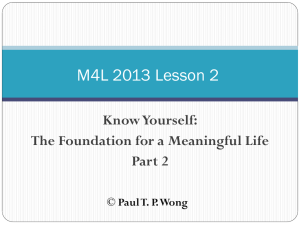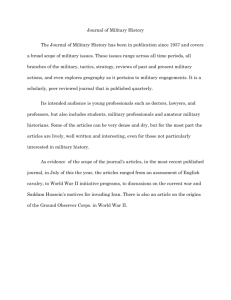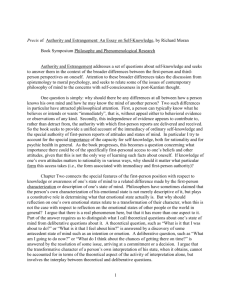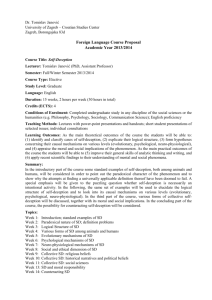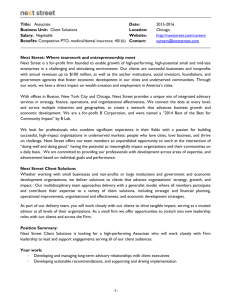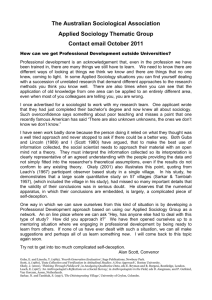Fingarette Ch4
advertisement
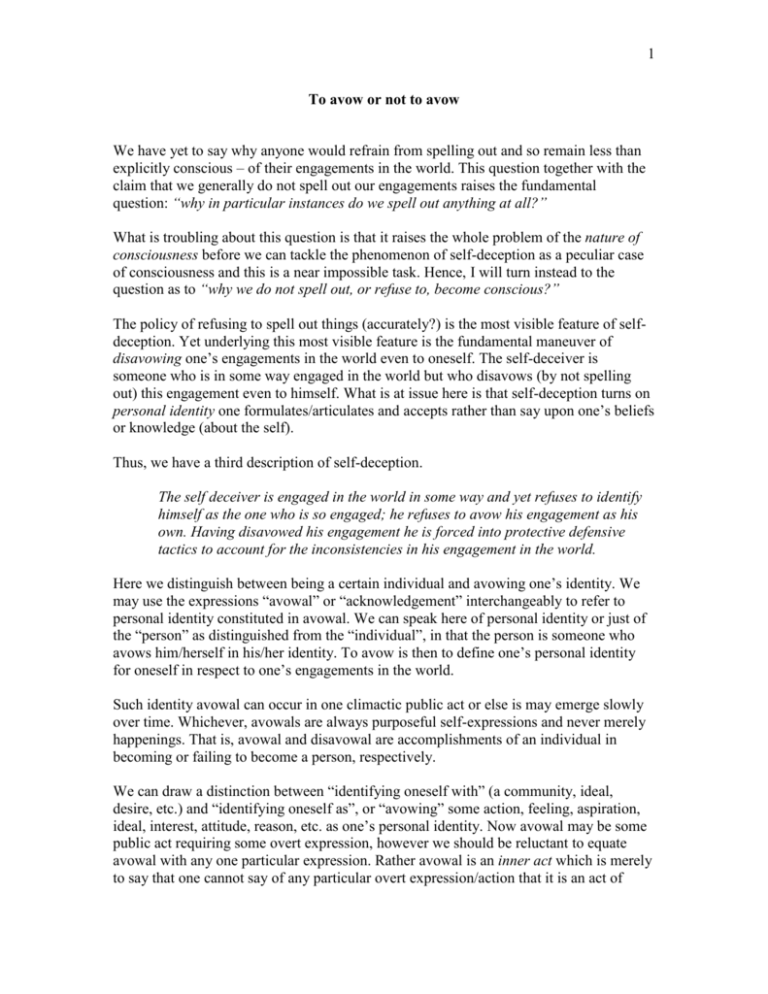
1 To avow or not to avow We have yet to say why anyone would refrain from spelling out and so remain less than explicitly conscious – of their engagements in the world. This question together with the claim that we generally do not spell out our engagements raises the fundamental question: “why in particular instances do we spell out anything at all?” What is troubling about this question is that it raises the whole problem of the nature of consciousness before we can tackle the phenomenon of self-deception as a peculiar case of consciousness and this is a near impossible task. Hence, I will turn instead to the question as to “why we do not spell out, or refuse to, become conscious?” The policy of refusing to spell out things (accurately?) is the most visible feature of selfdeception. Yet underlying this most visible feature is the fundamental maneuver of disavowing one’s engagements in the world even to oneself. The self-deceiver is someone who is in some way engaged in the world but who disavows (by not spelling out) this engagement even to himself. What is at issue here is that self-deception turns on personal identity one formulates/articulates and accepts rather than say upon one’s beliefs or knowledge (about the self). Thus, we have a third description of self-deception. The self deceiver is engaged in the world in some way and yet refuses to identify himself as the one who is so engaged; he refuses to avow his engagement as his own. Having disavowed his engagement he is forced into protective defensive tactics to account for the inconsistencies in his engagement in the world. Here we distinguish between being a certain individual and avowing one’s identity. We may use the expressions “avowal” or “acknowledgement” interchangeably to refer to personal identity constituted in avowal. We can speak here of personal identity or just of the “person” as distinguished from the “individual”, in that the person is someone who avows him/herself in his/her identity. To avow is then to define one’s personal identity for oneself in respect to one’s engagements in the world. Such identity avowal can occur in one climactic public act or else is may emerge slowly over time. Whichever, avowals are always purposeful self-expressions and never merely happenings. That is, avowal and disavowal are accomplishments of an individual in becoming or failing to become a person, respectively. We can draw a distinction between “identifying oneself with” (a community, ideal, desire, etc.) and “identifying oneself as”, or “avowing” some action, feeling, aspiration, ideal, interest, attitude, reason, etc. as one’s personal identity. Now avowal may be some public act requiring some overt expression, however we should be reluctant to equate avowal with any one particular expression. Rather avowal is an inner act which is merely to say that one cannot say of any particular overt expression/action that it is an act of 2 avowal. Overt conduct may express avowal but it does not constitute avowal. I like to think of avowal as an act of the total psychic nexus – such avowal will manifest itself in expressions but no expression can fully constitute avowal (just as the (sad) properties of an art work do not fully constitute the work of art, say as a “sad work”). Understanding self-deception as disavowal present us with a fundamental answer to the question, above, “why is it so important not to spell out certain (aspects) of our engagement in the world?” Consider: 1. One mark that differentiates what is intrinsic to our personal identity from what is not is the capacity of the person to spell out that personal identity. For the spell out one’s identity is to exercise a peculiar kind of authority, an authority that is intimately connected with one’s existence as a particular person (in Cartesian fashion one speaks with authority of one’s desires and ideals). For example, when someone says in angry tone of voice “I am angry with you” we may assume that the anger expressed here is acknowledged as one’s own. But of course a person may also say in an angry tone of voice “I am not angry” in which case one can disavow one’s anger even as one is clearly angry. 2. Another mark of disavowal is the high degree to which the disavowed engagement is isolated from the influence of everything that is avowed. In this way what is disavowed remains “static”, “primitive”, and “rigid” (Kohut: “archaic”). This rigidity of the disavowed engagement (not withstanding some ingenuity of execution) is a manifestation of isolation from the remainder of the personality (in a sense one is double-minded, or in Kohut’s terms vertically split in the poles of desires and ideals). 3. A third mark of disavowal is the denial of responsibility. Typically, a person denies responsibility for what is disavowed, whereas one is prepared to bear responsibility for what is avowed. We can distinguish between avowal of personal identity and the responsibility of moral identity. But these are really very similar, or better, personal identity avowal is prospectively constitutive of moral identity avowal (bearing responsibility for what is avowed). Thus there are 3 marks of disavowal: 1. incapacity to spell out (silence) 2. isolation of what is disavowed (archaic conduct/desire/ideals) 3. non-responsibility (for that which about which one is silent or what is archaic Note that all three marks are profoundly significant defect of personal/moral integrity. On the other hand, if we ask what is meant by personal integrity, we can reply: 1. the capacity to speak on one’s own behalf about how one is engaged in the world, 3 2. the capacity for harmonious self-understanding of conduct, feelings, desires, aspirations, interests, etc., 3. and to assume full responsibility for both the above. Note here that the notion of avowal and its role in understanding self-deception raises some fundamental questions concerning the ambiguities in such terms as “self”, “herself”, “person” and “I”. Thus, is the “I” who disavows anger the same “I” who is angrily engaged in the world? The answer, initially at least, is both “yes” and “no”. We will turn to this below. First, we should note that unless the issue of personal/moral identity is raised, we cannot understand the phenomenon of self-deception. That is, one reason why I have not turned to the experimental psychology of the self because it never raises the question of personal identity (or “what is a person?”). It is also why we can turn to writers like Freud, Sartre, and Kierkegaard because all three have argued that self-deception is an illness peculiar to our “subjectivity”, i.e., the self, or the person. Thus, in different ways they speak of selfdeception as alienation from the self, or an evasion of being one-self. One is so to speak “willfully ignorant”, “double-minded”, “spiritually defiant”, “divided against oneself”, “insincere with oneself”, or “morally blinded”. In this regard, I will also drawn on Kohut/Lacan since it is important not to oppose desire/will and reason, to merely speak of “one’s lower nature and higher nature”, or of “the spirit is willing but the flesh is weak” all of which makes self-deception into a kind of irrationality or a lack of self-control (which of course may well be motives for self-deception). Because experimental psychological approaches tend to focus on reason, these also focus on knowledge and ignorance in case of self-deception. Second, we should note that avowal as identity avowal suggests that one’s identity is not given (biologically or socially) but rather that one’s personal identity merges over/in time as an achievement of using “materials” (engagements in the world) that are recalcitrant to any ordering or synthesis (i.e., causal explanation). Identity avowal is an ordering (Taylor’s “strong evaluation”) of meanings/significances of engagements over the lifespan that lead us to become a person – a unified self (or one-self). We can include here, in this idea of the self as a synthesis, Freud’s notion of “defense” Sartre’s notion of “bad faith”. We essentially must take a developmental view of the synthesis of the self wherein the self is a “community” (rather than an association or a collection) of various complexes of reason-desire-feeling-purpose-value as “lived projects” that can be transformed into a unity but which nevertheless never lose their distinctive character. Just as the child becomes civilized or domesticated as a member of a community even as s/he retains his/her individuality, just so primitive and independent forms of engagement are ideally integrated with each other in a self even as these remain the medium of selfexpression. I will give some examples in class. Third, we should note that these criteria of self-deception are sufficiently general to apply to all disordered conduct (what is called “mental illness”). In a sense all mental illness is a distortion of selfhood (for whatever causes or reasons) and so underlies or, better, 4 constitutes “mental” disturbances or what I would now call disturbances of the self, or disturbances of selfhood/personhood/person. Generally speaking, with the emergence of the person in the individual there is an increasing correlation between what is avowed by the person and the manner in which the person is actually engaged in the world (whether as ideals or desires, a la Kohut). There is here an ideal of perfect harmony (what we might call “character” with its unified and moral nature implied) and this is also what we mean by “maturity” (in contrast to “growing up” or just older). Maturing is here an honorific term, much as all psychological predicates are honorary terms (or achievement terms), that reflects different norms both social-cultural and individually. I will pursue this in my lectures. Now the self-deceiver is somehow provoked (in living) to engage in projects that s/he cannot avow as being his/her identity for such avowal would be disruptive, distressing, and unmanageably destructive to the person. The crux here resides in the fact that the engagement is unacceptable to the self-deceiver even though s/he may be powerfully inclined (desiring) towards the engagement which is, however, in some sense incompatible with the individual’s past engagements which constitute her/his identity. Unlike children who might be able to pursue individual projects/engagements as autonomous projects/engagement, in time such isolate pursuits wreak havoc with the very possibility of becoming a person. The question remains of course whether such unity of self, such harmony among one’s projects/engagements is ever fully possible. But we cannot leave our projects/engagements as isolated from each other on risk that otherwise we would not attain personal/moral identity. LPM/2010
